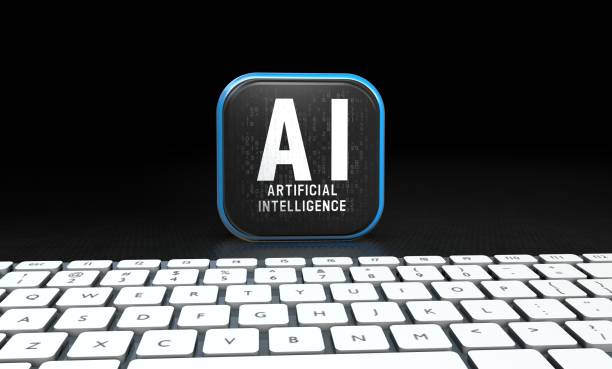What is Mobile Artificial Intelligence and What are its Applications?

Artificial intelligence (AI) in mobile phones refers to software and hardware that can perform tasks that usually require human intelligence.
These tasks include voice recognition, image recognition, natural language processing, machine learning, and decision-making.
Artificial intelligence in mobile AI applications can improve user experience, automate tasks, and provide new capabilities.
Common uses of artificial intelligence in mobile include voice assistants like Siri and Google Assistant, facial recognition for unlocking phones, photo and video filters, language translation, and personalized suggestions.
Mobile AI applications are a turning point in human-machine interaction.
These capabilities allow users to interact with their devices more naturally and efficiently and benefit from more advanced features.
In the future, artificial intelligence is expected to play an even more prominent role in our daily lives, with mobile phones serving as intelligent and powerful tools.
Furthermore, developing mobile AI applications requires a deep understanding of machine learning algorithms as well as the ability to optimize these algorithms for execution on mobile devices with limited resources.
Did you know that 85% of customers check your company’s website before any interaction?
Build a corporate website worthy of your credibility with Rasaweb.
✅ Increase customer credibility and trust
✅ Attract high-quality leads
⚡ Get free website design consultation
Reviewing Platforms for Mobile AI Application Development

Choosing the right platform for developing mobile AI applications is one of the most important steps in the application development process.
There are several platforms for this purpose, each with its own advantages and disadvantages.
These platforms include Android, iOS, TensorFlow Lite, Core ML, and ML Kit.
Android, as the most popular mobile operating system, offers extensive features for developing artificial intelligence applications.
iOS, with its powerful hardware and software optimizations, provides a suitable platform for running artificial intelligence models.
TensorFlow Lite is a lightweight and optimized library for running machine learning models on mobile devices.
Core ML is Apple’s dedicated framework for running machine learning models on iOS devices.
ML Kit is a collection of Google APIs that allows the use of artificial intelligence capabilities in mobile applications.
Developers should choose the appropriate platform based on project needs, available resources, and level of expertise.
Also, considering factors such as performance, battery consumption, security, and scalability is very important in selecting a platform.
In general, choosing the right platform can significantly impact the success of a mobile AI application and provide a better user experience for users.
Given the growing use of artificial intelligence in mobile phones, development platforms for these types of applications are expected to continuously improve and offer new features.
Collecting and Preparing Data for Mobile AI Applications

Data is the lifeblood of any artificial intelligence system.
Without sufficient, high-quality data, a mobile AI application cannot function properly and deliver the desired results.
Collecting and preparing data is one of the most important and time-consuming steps in the development process of artificial intelligence applications.
Data can be collected from various sources, including mobile sensors, external APIs, databases, and user-generated data.
After collecting the data, it is necessary to clean and prepare it.
This process includes removing duplicate data, correcting incorrect data, filling in missing values, and converting data to a suitable format for training artificial intelligence models.
Also, dividing the data into training, validation, and test sets is of high importance.
The training set is used to train the model, the validation set is used to adjust the model parameters and prevent overfitting, and the test set is used to evaluate the final performance of the model.
Considering data privacy and security is also very important in the data collection and preparation process.
Ensuring that data is collected and used in compliance with applicable laws and regulations.
Given the importance of data in the performance of mobile AI applications, investing in collecting and preparing high-quality data can significantly impact the success of these types of applications.
| Data Type | Source | How to Collect |
|---|---|---|
| Images | Mobile Camera, Gallery | Access to Camera and Gallery |
| Audio | Mobile Microphone | Access to Microphone |
| Text | Keyboard, APIs | Receiving User Input, Using APIs |
Designing and Training AI Models for Mobile AI Applications

Designing and training artificial intelligence models is a crucial step in developing mobile AI applications.
At this stage, an appropriate AI model should be designed based on the type of task and available data.
There are different models for different tasks, including deep neural networks, support vector machines, decision trees, and clustering algorithms.
After designing the model, it must be trained using the collected data.
The training process involves adjusting the model parameters so that it can perform the desired task with high accuracy.
Different optimization algorithms are used for training models, including gradient descent, evolutionary algorithms, and population-based algorithms.
Also, evaluating the model performance during the training process is very important.
For this purpose, different evaluation metrics are used, including accuracy, recall, F1-score, and AUC.
If necessary, the model can be improved using various techniques such as regularization, dropout, and data augmentation.
After training the model, it should be optimized for execution on mobile devices.
This process includes reducing model size, reducing computational complexity, and using accelerator hardware.
Given the importance of designing and training artificial intelligence models in the performance of mobile AI applications, investing in this area can significantly impact the success of these types of applications.
Does your company’s website perform as befits your brand? In today’s competitive world, your website is your most important online tool. Rasaweb, a specialist in designing professional corporate websites, helps you to:
✅ Attract customer credibility and trust
✅ Convert website visitors into customers
⚡ Get a free consultation!
Optimizing AI Models for Efficient Execution on Mobile

Optimizing artificial intelligence models for execution on mobile devices is one of the important challenges in developing mobile AI applications.
Mobile devices have limited resources, including processing power, memory, and battery.
Therefore, artificial intelligence models should be optimized in such a way that they can provide acceptable performance with minimal resource consumption.
There are different techniques for optimizing artificial intelligence models, including quantization, pruning, distillation, and weight sharing.
Quantization involves reducing the precision of the numbers used in the model.
For example, 32-bit numbers can be converted to 8-bit numbers.
Pruning involves removing unnecessary weights from the model.
Distillation involves training a smaller model using a larger model.
Weight sharing involves using shared weights between different layers of the model.
In addition to these techniques, accelerator hardware such as GPUs and NPUs can be used to improve the performance of the models.
GPUs are suitable for performing parallel computations, and NPUs are designed for performing specific artificial intelligence computations.
Given the importance of optimizing artificial intelligence models in the performance of mobile AI applications, investing in this area can significantly impact the success of these types of applications.
Optimizing artificial intelligence models not only improves application performance but also reduces battery consumption and increases device lifespan.
Implementation and Integration of AI Models in Mobile Applications

Implementation and integration of artificial intelligence models in mobile AI applications is a crucial step that requires sufficient knowledge and experience in the field of mobile software development as well as familiarity with artificial intelligence frameworks and libraries.
After optimizing the AI model, it must be implemented in the mobile application.
This process includes writing code to load the model, process input data, run the model, and display the results.
For implementing artificial intelligence models in mobile applications, different frameworks and libraries can be used, including TensorFlow Lite, Core ML, and ML Kit.
TensorFlow Lite is a lightweight and optimized library for running machine learning models on mobile devices.
Core ML is Apple’s dedicated framework for running machine learning models on iOS devices.
ML Kit is a collection of Google APIs that allows the use of artificial intelligence capabilities in mobile applications.
In addition to these frameworks and libraries, different programming languages such as Java, Kotlin, Swift, and C++ can be used to implement artificial intelligence models in mobile applications.
After implementing the model, it must be integrated with other components of the application.
This process includes establishing communication between the model and the user interface, managing data, and handling errors.
Given the importance of implementation and integration of artificial intelligence models in the performance of mobile AI applications, investing in this area can significantly impact the success of these types of applications.
Testing and Evaluating the Performance of Mobile AI Applications
![]()
Testing and evaluating the performance of mobile AI applications is an essential step in the development process.
At this stage, the application’s performance should be evaluated under different conditions and with various data to ensure the accuracy and correctness of the results.
Testing and evaluating the performance of artificial intelligence applications involves checking various aspects, including accuracy, recall, speed, battery consumption, and security.
Accuracy means the correctness of the results produced by the application.
Recall means the ratio of correct results to all results produced.
Speed means the time required to process data and produce results.
Battery consumption means the amount of energy consumed by the application.
Security means protecting data and preventing unauthorized access.
For testing and evaluating the performance of artificial intelligence applications, different methods can be used, including unit testing, integration testing, system testing, and acceptance testing.
Unit testing involves testing each component of the application separately.
Integration testing involves testing the communication between different components of the application.
System testing involves testing the entire application as a whole.
Acceptance testing involves testing the application by end-users.
After performing the tests, the results should be analyzed and the application improved if necessary.
Given the importance of testing and evaluating performance in the quality of mobile AI applications, investing in this area can significantly impact the success of these types of applications.
| Test Type | Purpose | Tools |
|---|---|---|
| Unit Test | Checking Performance of Each Unit | JUnit, Mockito |
| Integration Test | Checking Interaction of Units | Mockito, WireMock |
| System Test | Checking Performance of the Whole System | Appium, Espresso |
Security Considerations in Mobile AI Application Development

Security is one of the most important aspects in developing mobile AI applications.
Artificial intelligence applications deal with sensitive data, and if security considerations are not followed, they may be attacked and user information may be compromised.
Security considerations in the development of artificial intelligence applications include various aspects, including data protection, prevention of adversarial attacks, and access management.
Data protection includes data encryption, the use of security protocols, and compliance with privacy laws.
Adversarial attacks include manipulating input data to the artificial intelligence model to produce incorrect results.
Access management includes restricting user access to data and application capabilities.
To increase the security of mobile AI applications, different techniques can be used, including the use of two-factor authentication, the use of firewalls and intrusion detection systems, and regular penetration tests.
Also, educating users about security threats and how to protect themselves is very important.
Given the importance of security in mobile AI applications, investing in this area can significantly impact the success of these types of applications.
Providing security not only protects user data but also increases user trust in the application.
In addition, using secure and reliable APIs can also help improve security.
OWASP Mobile Top 10 is a great resource for reviewing security vulnerabilities in mobile applications.
Are you tired of your online store having visitors but not sales? Rasaweb solves your core problem by designing professional online stores!
✅ Significant increase in sales with targeted design
✅ Seamless user experience for your customers
⚡ Get free advice!
Reviewing the Challenges and Opportunities Facing the Development of Mobile AI Applications

The development of mobile AI applications comes with numerous challenges and opportunities.
Challenges include the limited resources of mobile devices, the complexity of artificial intelligence models, the need for large and high-quality data, and security considerations.
The limited resources of mobile devices make it difficult to run large and complex artificial intelligence models on them.
The complexity of artificial intelligence models makes their development and maintenance difficult.
The need for large and high-quality data makes data collection and preparation time-consuming and costly.
Security considerations mean that developers must pay special attention to application security.
However, in addition to the challenges, there are many opportunities in the development of mobile AI applications.
These opportunities include improving user experience, increasing efficiency, automating tasks, and providing new services.
Improving user experience includes providing personalized suggestions, answering user questions quickly and accurately, and providing an attractive and user-friendly user interface.
Increasing efficiency includes optimizing application performance, reducing battery consumption, and reducing response time.
Automating tasks includes performing repetitive and tedious tasks automatically.
Providing new services includes providing artificial intelligence-based services such as facial recognition, voice recognition, and language translation.
Given the growing use of artificial intelligence in mobile phones, more opportunities are expected in this area.
Therefore, developers should develop innovative and practical mobile AI applications by identifying the challenges and taking advantage of the opportunities.
The Future of Mobile AI Applications and Emerging Trends

The future of mobile AI applications is very bright and full of potential.
With the advancement of technology, the artificial intelligence capabilities in mobile phones are expected to increase significantly.
Emerging trends are forming in this area that can significantly impact the future of these types of applications.
These trends include federated learning, edge AI, and explainable AI.
Federated learning is a machine learning method in which the artificial intelligence model is trained on data available on different devices without the data being transferred to a central server.
This method preserves user privacy.
Edge AI involves running artificial intelligence models on edge network devices, such as mobile phones, instead of central servers.
This method reduces latency, reduces bandwidth consumption, and increases security.
Explainable AI involves developing artificial intelligence models that can explain how they make decisions.
This feature increases user trust in artificial intelligence models.
In addition to these trends, mobile AI applications are expected to play a more prominent role in areas such as health care, education, transportation, and entertainment.
For example, artificial intelligence applications can help doctors diagnose diseases, help students learn new materials, help drivers navigate, and help users find entertaining content.
Given the high potential of artificial intelligence in mobile phones, mobile AI applications are expected to become one of the most important tools in our daily lives.
Frequently Asked Questions
| Number | Question | Answer |
|---|---|---|
| 1 | What is a mobile AI application? | A mobile AI application is a program that uses artificial intelligence capabilities (such as machine learning, natural language processing, computer vision) to provide smarter and more automated experiences on mobile devices. |
| 2 | Why is artificial intelligence important in mobile applications? | Its importance is due to increased efficiency, personalization of the user experience, automation of tasks, improved decision-making, and the provision of innovative capabilities such as facial recognition or voice assistants. |
| 3 | What are some examples of mobile applications with artificial intelligence? | Voice assistants (such as Siri, Google Assistant), navigation programs with real-time traffic (Google Maps), image filters (Snapchat, Instagram), language translation programs, and facial recognition applications. |
| 4 | What are the challenges in developing mobile AI applications? | Hardware limitations of mobile devices (processing power, battery), the need for large and high-quality data, preserving user privacy, and the complexity of implementing artificial intelligence models. |
| 5 | What is the role of machine learning in these applications? | Machine learning allows the application to learn from data, identify patterns, and improve its performance over time, such as product recommendation systems or speech recognition. |
| 6 | Do mobile AI applications need an internet connection? | Many advanced artificial intelligence capabilities require an internet connection and cloud processing, but some lighter models can also work “on-device” (without internet). |
| 7 | How does artificial intelligence help improve the user experience on mobile? | By personalizing content, predicting user needs, automating repetitive tasks, and providing more natural user interfaces such as voice commands. |
| 8 | What is the difference between cloud AI and on-device AI in mobile? | Cloud AI uses powerful servers for processing (requires internet), while on-device AI performs processing directly on the phone itself (no internet required, but with processing limitations). |
| 9 | What will the future of mobile AI applications be like? | We expect to see increased personalization capabilities, deeper integration with phone sensors, the development of smarter assistants, and advances in on-device processing. |
| 10 | Which frameworks are popular for developing artificial intelligence on mobile? | TensorFlow Lite (for Android and iOS), Core ML (for iOS), and PyTorch Mobile are among the popular frameworks for implementing artificial intelligence models in mobile applications. |
and other services of Rasa Web Advertising Agency in the field of advertising
Smart Google Ads: A professional solution for attracting customers by focusing on precise audience targeting.
Smart Website Development: Professional optimization for managing campaigns using a content strategy focused on SEO.
Smart Digital Advertising: Designed for businesses looking to grow online through attractive user interface design.
Smart Content Strategy: A new service to increase campaign management through custom programming.
Smart Brand Identity: Transform campaign management with the help of user experience customization.
and more than hundreds of other services in the field of internet advertising, advertising consulting, and organizational solutions
Internet Advertising | Advertising Strategy | Advertorial
Resources
? At Rasaweb Afarin, your dream of a strong presence in the digital world becomes a reality. We elevate your business by providing comprehensive digital marketing services including fast website design and professional optimization.
📍 Tehran, Mirdamad Street, next to the Central Bank, Kazeroon Jonoubi Alley, Ramin Alley No. 6
“`




